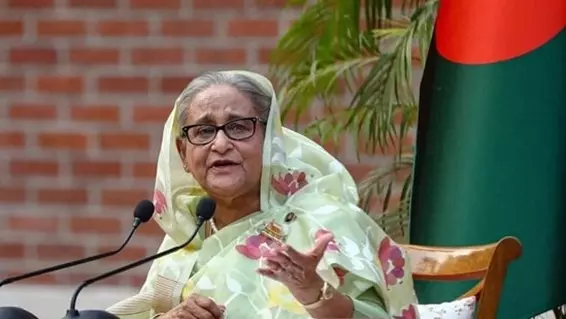
Bangladesh court sentences Sheikh Hasina to death for crimes against humanity
Tried in absentia, the ousted prime minister was found guilty of ordering deadly crackdowns during the 2024 student-led uprising

Bangladesh's deposed prime minister Sheikh Hasina was on Monday (November 17) sentenced to death in absentia by a special tribunal for "crimes against humanity" committed during the wide-spread protests against her government in July last year.
Hasina, 78, who has been living in India since her government was toppled on August 5 last year, was sentenced by the International Crimes Tribunal (ICT-BD). She was earlier declared a fugitive by the court.
Also read | Sheikh Hasina says restoration of participatory democracy key condition for her return
The tribunal said that Hasina committed crimes against humanity by her incitement order and also by failing to take preventive and punitive measures. It further stated that Hasina committed one count of crimes against humanity by her order to use drones, helicopters and lethal weapons on protesters.
Earlier in the day, Bangladesh’s International Crimes Tribunal (ICT-BD) began delivering its verdict in the case against deposed Prime Minister Sheikh Hasina, who is being tried in absentia over alleged crimes against humanity committed during last year’s student-led agitation that led to the ouster of her Awami League government.
Along with Hasina, two of her aides, former home minister Asaduzzaman Khan Kamal and former police chief Chowdhury Abdullah Al-Mamun, are facing the same charges. Mamun was produced before the tribunal.
Prosecutors sought death penalty
Prosecutors have sought the death penalty for the accused. Hasina, 78, faces multiple charges arising from the mass uprising that forced her out of office in August 2024. A UN rights office report estimates that up to 1,400 people were killed between July 15 and August 15 during the “July Uprising” as her government ordered a sweeping security crackdown.
Also Read: Dhaka under pressure from businesses to mend ties with India
Hasina and Kamal were declared fugitives and tried in absentia, while Mamun initially faced trial in person before turning approver.
Chief Prosecutor Mohammad Tajul Islam has described Hasina as the “mastermind and principal architect” of the alleged atrocities during the protests. Her supporters maintain the charges are politically motivated.
What happened in the trial so far?
The tribunal concluded hearings on October 23 after 28 working days, during which 54 witnesses testified about the state’s response to the student-led movement that toppled Hasina’s government on August 5, 2024.
Also Read: Yunus sparks fresh row with map showing India’s North East as part of Bangladesh
Hasina fled Bangladesh the same day amid intensifying unrest and has since been residing in India. Kamal is also believed to have taken refuge in India. The interim government led by Muhammad Yunus has sought Hasina’s extradition, but India has yet to respond.
Security beefed up
Security has been heightened nationwide ahead of the verdict. Dhaka Metropolitan Police Commissioner Sheikh Md Sajjat Ali on Sunday evening issued shoot-at-sight orders against anyone involved in arson, explosions or attempts to harm police and civilians.
Also Read: Yunus says Bangladesh has problems with India over hosting Hasina
The now-disbanded Awami League called a two-day shutdown ahead of the judgment. Army troops, Border Guard Bangladesh personnel and riot police have been deployed around the ICT-BD complex, with streets in the capital largely deserted amid fears of violence.
Charges against Hasina, her two aides
Hasina, Kamal and Mamun face five charges, including murder, attempted murder, torture and other inhumane acts. A key charge accuses Hasina of ordering the “extermination” of protesters. She is also accused of making inflammatory remarks and directing the use of deadly weapons against students.
Additional charges relate to the shooting deaths of six unarmed protesters in Dhaka and surrounding areas.
Hasina’s rebuttal
Earlier in the day, Hasina had rejected the allegations of crimes against humanity brought against her, declaring that the charges were false and that she did not care about the court verdict.
Also Read: What’s behind Yunus’ anti-India tirade? Fear of Awami revival, power goals
In an audio message sent to her supporters before the International Crimes Tribunal issues its ruling, the Awami League leader accused the interim government led by Nobel laureate Muhammad Yunus of attempting to destroy her party. “It is not so easy, Awami League has come up from the grassroots, not from the pocket of some usurper of power,” she said in Bengali, reported NDTV.
Hasina praises supporters
Hasina also praised her supporters for joining the protest plans across Bangladesh. “They have given us faith,” she said, adding, “People will show this corrupt, militant, and murderer Yunus and his aides how Bangladesh can turn around; the people will do justice.”
Also Read: Will Bangladesh's pro-Islam foreign policy change after 2026 polls?
In interviews with international media and the Indian press, Hasina has labelled the tribunal a “kangaroo court” run by individuals aligned with her political opponents. In a recent emailed interview to PTI, she said she was willing to stand trial under international supervision “even at the International Criminal Court” in The Hague, alleging that Yunus avoided such a process because an impartial tribunal would acquit her.
The ICT-BD was originally established to try collaborators of Pakistani forces during Bangladesh’s 1971 Liberation War. The Yunus administration later amended its mandate to prosecute leaders of the previous regime, including Hasina. Most senior Awami League figures are either jailed or on the run.
(With agency inputs)

